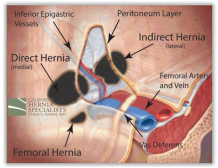
Inguinal hernia represents one of the more common indications for referral to a general surgeon. Patients who come see me describe a variety of symptoms ranging from "slight groin bulge when I cough" to "a dull ache" to "weird burning sensation" to "severe pain with activity". Hernias that are causing symptoms significant enough to incite a patient to seek an opinion from a physician (especially an older male who hates going to the doc, in general) probably ought to be repaired sooner rather than later. Not many surgeons would debate such a management protocol.
The more controversial clinical scenario is the mildly symptomatic or asymptomatic inguinal hernia. Previous surgical literature has suggested that a conservative apporach of "watchful waiting" is appropriate. If symptoms worsen, then surgical intervention would be the next step.
A new article from Annals of Surgery, however, suggests that, in select circumstances, even patients with minimally symptomatic or aymptomatic inguinal hernias ought to at least consider elective repair. This accords with an earlier study from the UK that found a benefit to earlier repair in patients without incapacitating symptoms. The driving rationale for this new recommendation is that 70-75% of men with initially asymptomatic hernias in the long term studies eventually developed symptoms (pain, most prominently) and elected to undergo surgical repair within 7-8 years.
MY TAKE:
I have several guiding principles when it comes to minimally symptomatic groin hernias.
The more controversial clinical scenario is the mildly symptomatic or asymptomatic inguinal hernia. Previous surgical literature has suggested that a conservative apporach of "watchful waiting" is appropriate. If symptoms worsen, then surgical intervention would be the next step.
A new article from Annals of Surgery, however, suggests that, in select circumstances, even patients with minimally symptomatic or aymptomatic inguinal hernias ought to at least consider elective repair. This accords with an earlier study from the UK that found a benefit to earlier repair in patients without incapacitating symptoms. The driving rationale for this new recommendation is that 70-75% of men with initially asymptomatic hernias in the long term studies eventually developed symptoms (pain, most prominently) and elected to undergo surgical repair within 7-8 years.
MY TAKE:
I have several guiding principles when it comes to minimally symptomatic groin hernias.
- Can I see it across the room? Hernias that are obvious upon visual inspection (big balloning inguinal canal bulge or scrotal mass) generally are a problem waiting to happen, as opposed to subtle defects that require interrogation of the internal ring in order to appreciate.
- Patient characteristics. A wheel chair bound 88 year old male doesn't need surgery on a hernia that doesn't bother him. On the other hand, a fit and healthy 75 year old who golfs three days a week ought to consider getting pre-emptive repair.
- I think it's hard to justify just ignoring a younger patient (i.e. < 45) with an obvious hernia, even with zero symptoms. That thing is not going to go away, it will probably get larger, and at some point it will start to cause pain/discomfort. And it's always easier to fix a small hernia; quicker surgery, better anatomy, fewer post op issues.....

 RSS Feed
RSS Feed